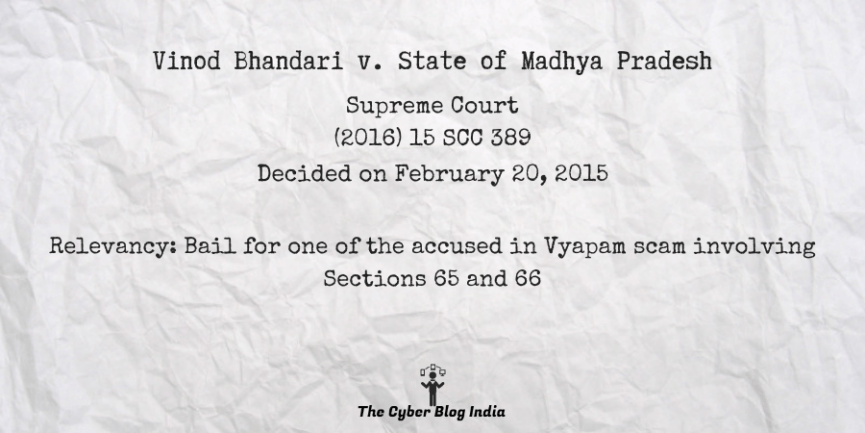Vinod Bhandari v. State of Madhya Pradesh

Vinod Bhandari v. State of Madhya Pradesh
(2016) 15 SCC 389
In the Supreme Court of India
Crl. A. 220/2015
Before Justice T.S. Thakur and Justice Adarsh Kumar Goel
Decided on February 20, 2015
Relevancy of the case: Bail for one of the accused in Vyapam scam involving Sections 65 and 66 of the IT Act, 2000
Statutes & Provisions Involved
- The Indian Penal Code, 1860 (Section 420, 467, 468, 471)
- The Information Technology Act, 2000 (Section 65 and 66)
Relevant Facts of the Case
- The MP Professional Examination Board, established under MP Professional Examination Board Act, 2007, conducts tests for admissions to professional courses and streams.
- Undeserving students were helped to pass in an entrance test to get admission in Government and Private Medical Colleges providing MBBS courses.
- The appellant was the Managing Director of Shri Aurobindo Institute of Medical Sciences in Indore. During the investigation, it was found that money was received from candidates through the co-accused who was working in Bhandari Hospital. The co-accused was looking after the admission work in the institute and he was the one who helped undeserving students to pass by unfair means.
- A part of the money was given to the Senior System Analyst, the custodian of the model answer key along with the Controller.
- The candidates, officers, and some of the guardians were involved. Out of the 516 people accused, 329 were arrested.
- It was also alleged that the high scoring candidates were arranged in such a way that the unprivileged candidates could be given answers. Also, they were asked to leave the OMR sheet blank so that officers could fill the right answer later. The model answer key was printed and sent to the candidates. The appellant received crores of rupees for this.
- The appellant was arrested under Sections 420, 467, 468, and 471 of the Indian Penal Code, 1860 and Sections 65 and 66 of the Information Technology Act, 2000. The bail application had been dismissed by the High Court.
Opinion of the Bench
- The bench stated that the appellant was in custody for a year and an immediate trial was not conducted. Right to a speedy trial is one’s right and it is the duty of the prosecution to carry out the trial. Therefore, a speedy trial must be ensured. The High Court is requested to take up this matter once in three months and issue the necessary directions.
- The bench also held that the offence is of high magnitude by undermining the trust of the public on medical institutions. If undeserving students come to the forefront for treating patients in the future, the patients will find it hard to have faith in them. No ground was found which interferes with the decision of the High Court declining bail.
Final Decision
- The appeal was disposed of as the bench finds no merit in the same.
